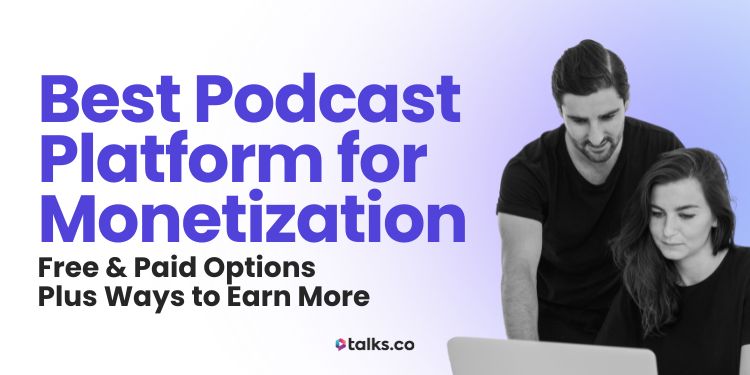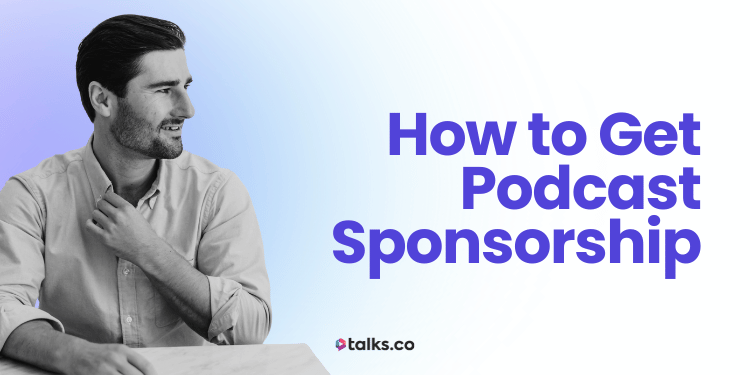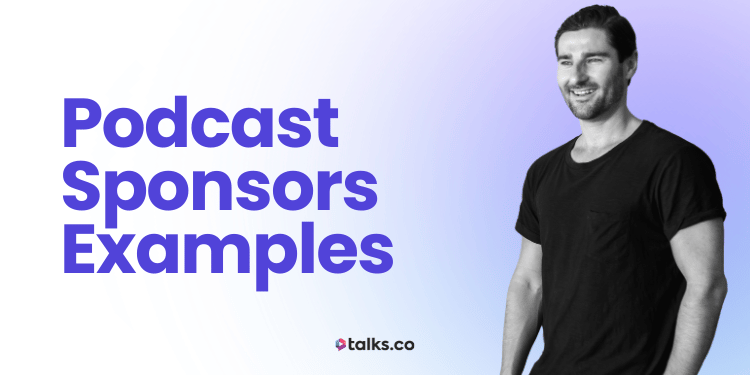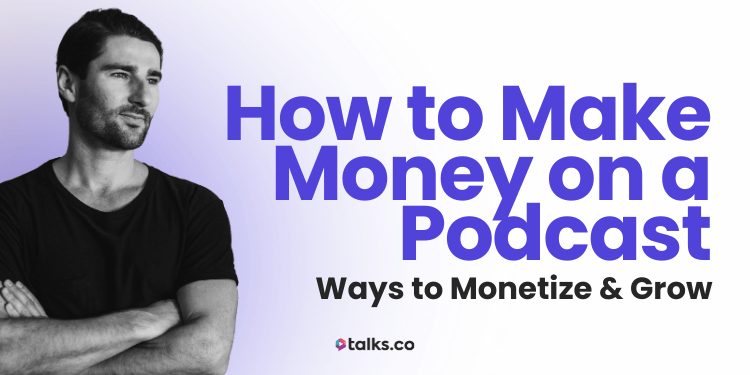Want to turn your podcast into a serious revenue stream? Whether you’re just starting out or you’ve been hosting shows for a while, it’s important to find the right platform that lets you monetize your content without the headache.
Having interviewed over 400 guests and been interviewed myself on various platforms – I’ve seen it all – I can tell you: there’s no one-size-fits-all solution. But there are definitely podcasting platforms that make it way easier to start making money from your podcast.
From securing sponsors to offering paid content, there are so many ways to start bringing in income if you know where to look.
In this article, I’m going to lay out the best podcast platforms for monetization. But this isn’t just another generic list. I’m digging into the details: why each podcasting platform stands out, the pros and cons, and how the best podcast platform for monetization could work for your unique needs.
Whether you’re a newbie just starting to think about monetization or a seasoned podcaster ready to grow your podcast even more, I’ve got you covered.
So, if you’re ready to turn your podcast episodes into profit and gain the time freedom you’ve been dreaming of, stick around.
Best Podcast Platform for Monetization
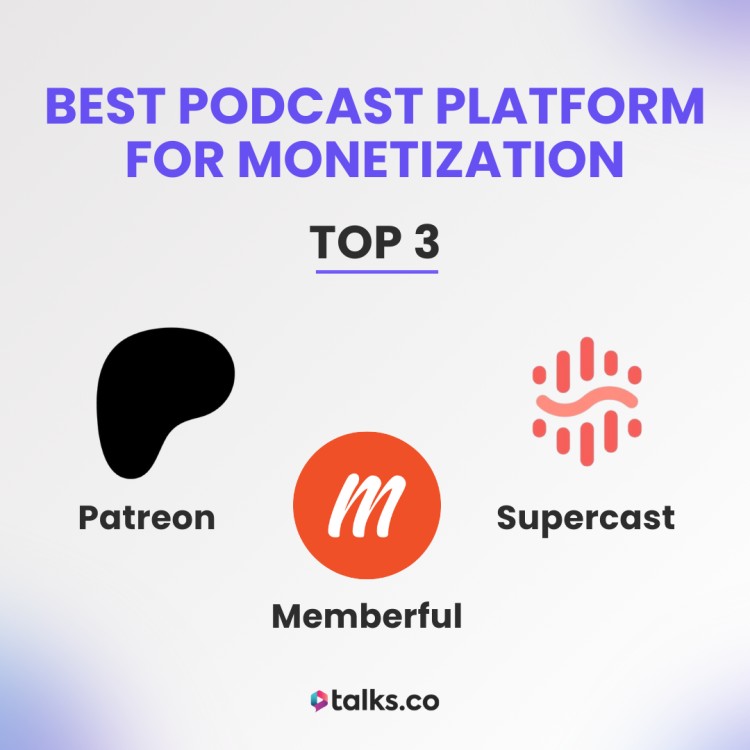
When it comes to monetizing your podcast, there are a ton of options out there. But not all platforms are created equal. To save you time, I’ve narrowed it down to the top three best podcast hosting platforms that deliver results.
Here’s a quick look at the most popular podcast choices, based on their unique features and who they’re best suited for.
1. Patreon
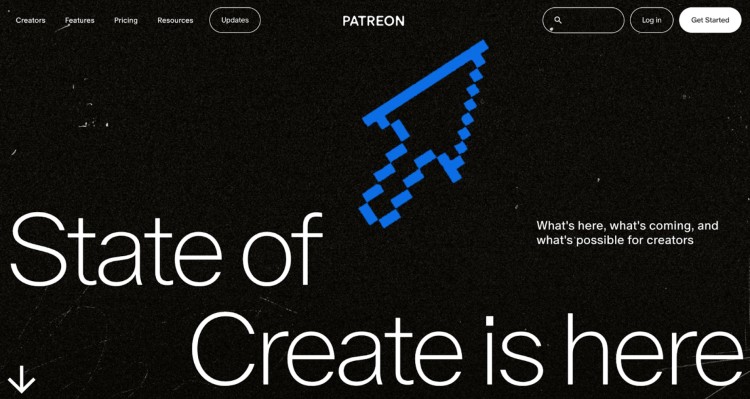
Best for: Creators who want to build a loyal community and offer exclusive content.
Patreon lets your audience support you directly through memberships. You can offer different tiers with exclusive content, merchandise, or behind-the-scenes access. It’s perfect for podcasters who want to build a community and receive steady, predictable income from listeners who support your work.
- Commission: Pro plan: 8% of your earnings; Premium plan: 12% of your earnings.
- Additional costs: For the Commerce plan, 5% of monthly sales earnings, plus payment processing, currency conversion, payout fees, and applicable taxes.
Pros:
- Flexibility with pricing and content offerings
- Regular, recurring income
- Strong community engagement
- Access to detailed analytics and insights
- Sell digital products directly through the platform
Cons:
- Requires consistent content creation to keep members engaged
- Building a significant number of paying subscribers may take time
2. Memberful
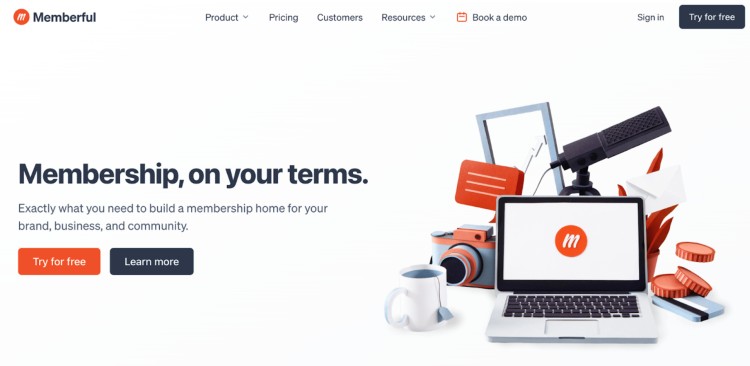
Best for: Podcasters who want full control over their private memberships and premium content.
Memberful allows podcasters to create and manage private, paid memberships with exclusive episodes and content. It gives you the freedom to set your pricing and membership tiers without worrying about revenue sharing.
- Commission: 0% platform commission on your earnings.
- Additional costs: Monthly plan: $49/month. Transaction fees apply depending on your payment processor.
Pros:
- Full control over pricing and membership management
- Integrates easily with platforms like WordPress and Stripe
- Ideal for building a dedicated, paying audience
- Access to a variety of features like custom branding, member management, and content protection tools
Cons:
- Requires self-promotion and marketing
- No built-in audience discovery tools
3. Supercast
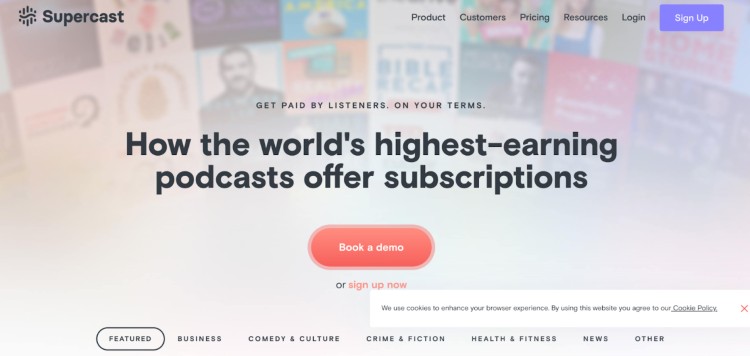
Best for: Podcasters who want a premium subscription model with high-quality content behind a paywall.
Supercast allows you to monetize your podcast through premium subscriptions, offering listeners access to exclusive episodes or content for a monthly fee. It’s ideal if you’re producing high-value content and want to offer it to an exclusive audience who’s willing to pay for it.
- Commission: 15% fee for one-time payments (up to $1.50 per payment).
- Additional costs: $0.59/month per subscriber. Stripe processing fees: 2.9% + $0.30 per transaction. Billing fee: 0.7% for recurring payments (can be reduced by 12-18% with a pay-monthly plan available from Stripe).
Pros:
- High-quality subscription model with seamless user experience
- Offers podcast-specific features like early access and bonus content
- Fully customizable plan pricing
- Unlimited subscriber plans and analytics tools
Cons:
- More complex to set up compared to free platforms
- Needs a dedicated audience that values premium content
Best Podcast Platform to Make Money: Spotify for Creators
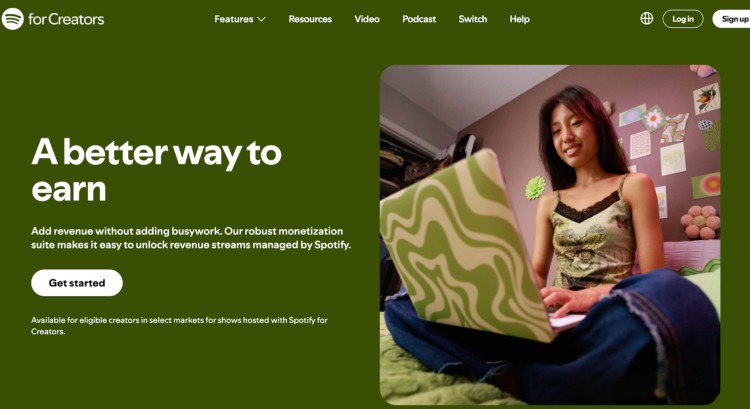
Best for: Podcasters who want an all-in-one platform with ad revenue, subscriptions, and audience growth tools.
Spotify for Creators includes Spotify’s Ambassador Ads, Automated Ads, and paid subscriptions, giving podcasters multiple ways to earn directly from their content. It also offers analytics and podcast content distribution tools to help grow your audience.
Ideal if you want built-in monetization without needing external tools. Spotify’s massive listener base also increases your potential reach.
- Commission: 50% share of ad revenue for ads monetized by Spotify within the Spotify Partner Program.
- Additional costs: No upfront fees for participation. Stream threshold for music royalties: Must have at least 1,000 streams in the previous 12 months.
Pros:
- Multiple revenue options (ads + subscriptions)
- Seamless integration with Spotify’s platform
- Access to audience insights and analytics
Cons:
- Revenue from ads depends on audience size
- Limited customization compared to independent monetization strategies
Which Podcast Platform Pays the Most: Apple Podcasts Subscriptions
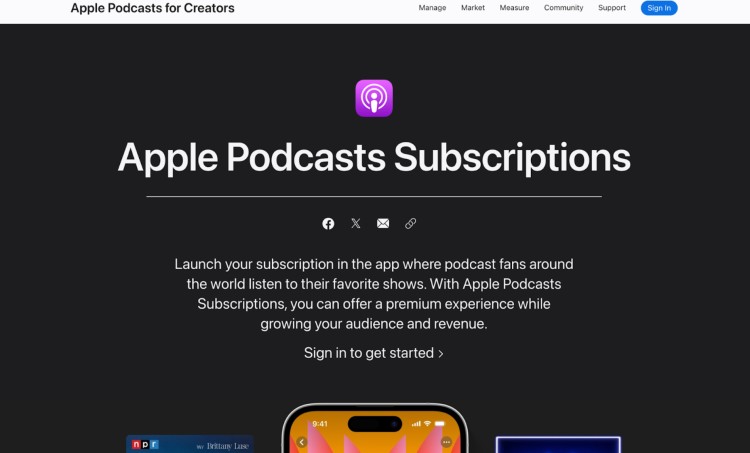
Best for: Monetizing premium content for Apple users who are looking for an easy integration with Apple’s ecosystem.
Apple Podcasts Subscriptions allow you to offer exclusive content, providing your listeners with benefits like ad-free listening, early access to episodes, additional content, and even subscriber-only shows. You can set flexible pricing options, offer free trials, and control the benefits your subscribers receive.
- Commission: 70% of the subscription price for the first year (minus taxes). 85% after one year (minus taxes). 30% commission on all other revenue like ads.
- Additional Costs: $19.99 annual fee to join the Apple Podcasters Program.
Pros:
- Large, built-in audience from the Apple ecosystem
- Flexible subscription options (monthly or annual)
- Ability to offer exclusive content and subscriber-only perks
- Seamless integration with Apple Podcasts and user-friendly setup
Cons:
- High commission fee for the first year.
- Limited to Apple’s ecosystem
15 Podcast Monetization Platforms
There are plenty of ways to make money from podcasting, but not every platform is worth your time. Here are 15 solid options to help you turn your podcast into a revenue stream.
1. Podbean Ads Marketplace

Best for: Automatic ad placements for small-to-mid-sized podcasts looking to monetize with minimal effort.
Podbean’s Ads Marketplace lets you earn revenue by inserting programmatic or host-read ads into your podcast episodes. You can set a minimum CPM (Cost Per Mille) that your podcast needs to reach for ad campaigns to be available. This model allows you to earn based on how many impressions (views) your ads get, making it accessible for podcasts with any audience size.
- Commission: No fixed commission rate; revenue is based on CPM (Cost Per Thousand Impressions). You can set your own minimum CPM threshold to be eligible for ad campaigns.
- Additional Costs: Free to join; premium plans are available for additional features.
Pros:
- Ads are automatically inserted into episodes.
- No audience size requirement for participation.
- Works seamlessly with Podbean’s existing hosting platform.
- Ability to choose between programmatic and host-read ads.
Cons:
- Earnings may be lower compared to direct sponsorships.
- Limited control over which ads are selected for your podcast.
2. RedCircle
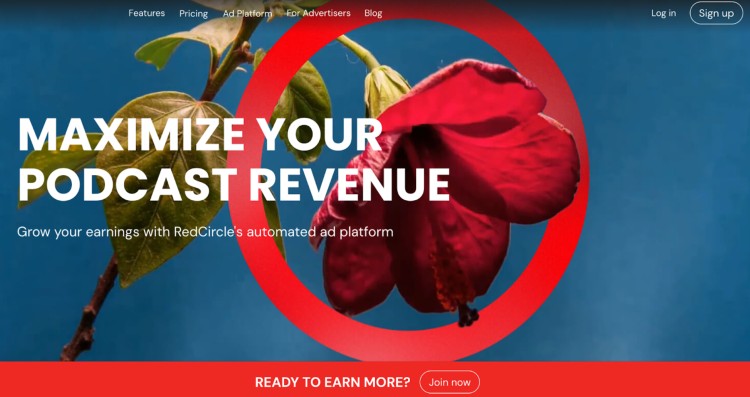
Best for: Dynamic ad insertion and premium content
RedCircle offers monetization options such as automated ads, listener donations, and paid subscriptions, with a focus on flexibility for podcasters at all stages.
- Commission: Revenue share varies by model; programmatic ads require 500+ weekly downloads.
- Additional costs: Free for basic features; paid plans start at $19.99/month with a 7-day free trial.
Pros:
- Easy dynamic ad insertion
- Supports listener donations
- Works for all podcast sizes
Cons:
- Revenue share model cuts into profits
- Not as widely recognized as other platforms
3. Acast+
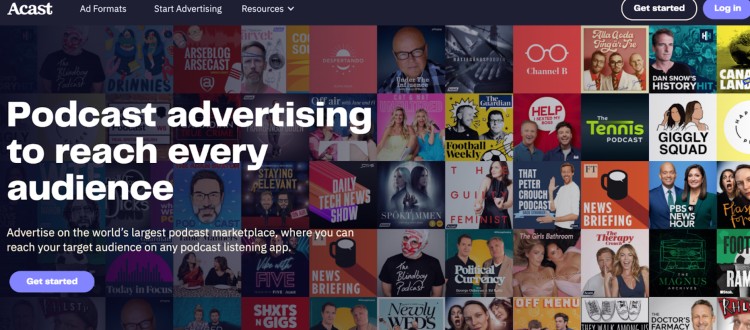
Best for: Premium subscriptions and ad-based revenue
Acast+ lets podcasters offer ad-free content, bonus episodes, and paid subscriptions.
- Commission: 15% revenue share with Acast
- Additional costs: Free plan available; premium options for more features
Pros:
- Supports multiple monetization methods
- Works across all major podcast platforms
- No minimum audience requirements
Cons:
- Acast takes a cut of revenue
- Requires self-promotion to get subscribers
4. Buzzsprout Ads
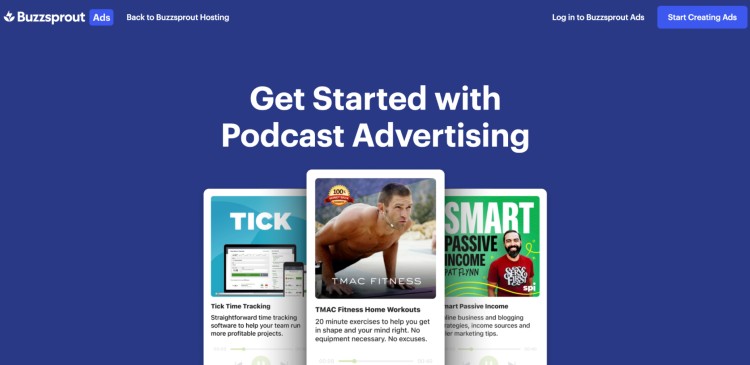
Best for: Automated ad placements for smaller podcasts
Buzzsprout Ads makes monetization easy by automatically inserting ads into your episodes.
- Commission: Revenue share with Buzzsprout
- Additional costs: Free to join; paid plans available
Pros:
- Simple setup for passive income
- No minimum downloads required
- Works with existing Buzzsprout hosting
Cons:
- Lower earnings than direct sponsorships
- Limited ad control
5. Spreaker
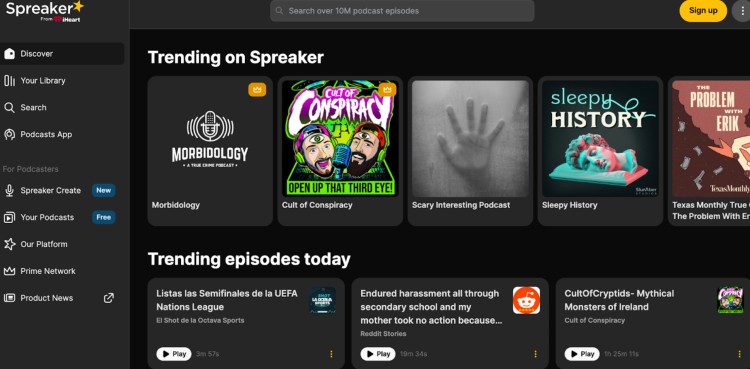
Best for: Podcasts that want built-in monetization with hosting
Spreaker’s monetization program auto-inserts ads, making it easy to earn.
- Commission: Spreaker takes a 40% cut of ad revenue; you keep 60%
- Additional costs: No upfront costs; revenue is earned through ads
Pros:
- No minimum audience size
- Built-in ad marketplace
- Simple monetization setup
Cons:
- Less control over ad selection
- Direct sponsorships pay more
6. Castos
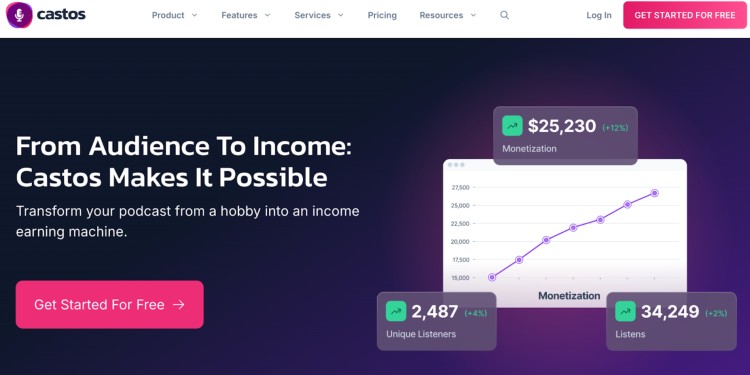
Best for: Private podcasting and premium content
Castos supports private RSS feeds for exclusive paid content.
- Commission: 25% on podcast hosting, 10% on production and launch services
- Additional costs: Subscription plans start at $19/month; Stripe processing fee for donations (2.9% + $0.30)
Pros:
- No revenue share
- Unlimited storage and bandwidth
- Great for memberships and premium content
Cons:
- No built-in audience discovery
- Requires independent marketing
7. Libsyn Ads
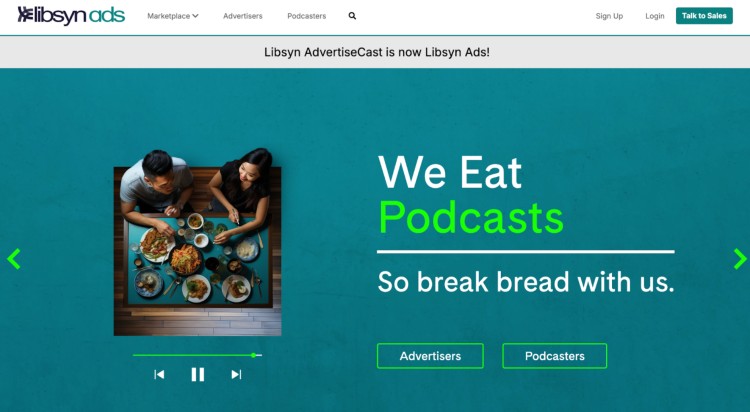
Best for: Finding sponsors for mid-to-large podcasts
Libsyn Ads is a marketplace connecting podcasters with brands for sponsorships.
- Commission: 30% of ad revenue (you keep 70%)
- Additional costs: None (after meeting the 20,000 downloads per episode requirement)
Pros:
- Direct access to advertisers
- Simple sponsorship management
- Great for mid-sized and large podcasts
Cons:
- High commission fee
- Not ideal for smaller podcasts
8. Podcorn

Best for: Small-to-medium podcasts looking for sponsorships
Podcorn allows podcasters to pitch brands for ad deals – great for those without massive audiences.
- Commission: 50% revenue share from ads run on your show
- Additional costs: None for hosting, but revenue share applies for ad earnings
Pros:
- No minimum audience requirement
- Direct negotiation with brands
- Full control over sponsorships
Cons:
- Requires outreach and pitching
- Some sponsors offer low rates
9. Captivate
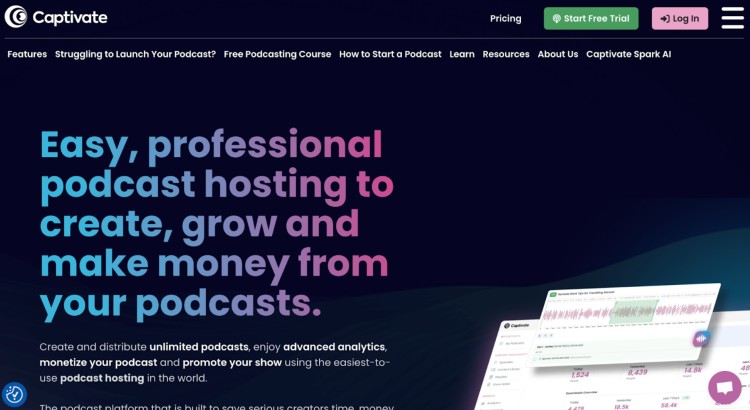
Best for: Growing and monetizing podcasts through dynamic ads
Captivate is a podcast hosting platform with built-in monetization tools, including ad insertion and sponsorships.
- Commission: 14.9% on membership revenue; 7.9% flat-rate fee on tips
- Additional costs: $0.30 per transaction for both membership revenue and tips. Withdrawal fee via Stripe: 0.25% + $0.30 per transaction.
Pros:
- No revenue share
- Easy-to-use ad integration
- Advanced analytics for growth tracking
Cons:
- No free plan
- No built-in marketplace for sponsors
10. Ko-fi
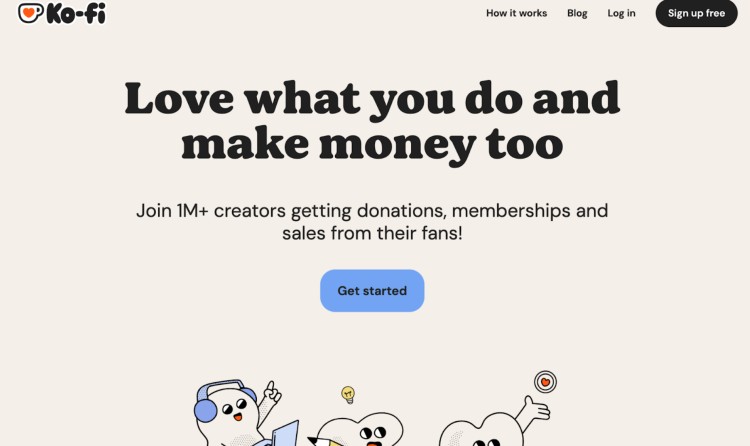
Best for: One-time listener donations
Ko-fi allows fans to send small, one-time payments to support your podcast.
- Commission: 0% to 5% (only when you make money)
- Additional costs: No monthly fees. Payments are processed via PayPal, Stripe, or other payment methods (no additional fees from Ko-fi).
Pros:
- Easy to set up
- No complex pricing tiers
- Works for all podcast sizes
Cons:
- Not a steady revenue stream
- Requires active promotion
11. Listener.fm

Best for: Podcasters looking for a straightforward way to monetize with listener support.
Listener.fm is designed to make it easy for creators to earn directly from their audience via one-off or recurring contributions.
- Commission: 0-5% based on your earnings
- Additional costs: Plans start at $19 per month. Payment methods include major credit cards.
Pros:
- Easy setup for listener donations.
- No subscription fees or hidden charges.
- Great for smaller podcasts and solo creators.
Cons:
- Relies entirely on listener generosity.
- Limited features compared to other platforms.
12. YouTube Podcasts
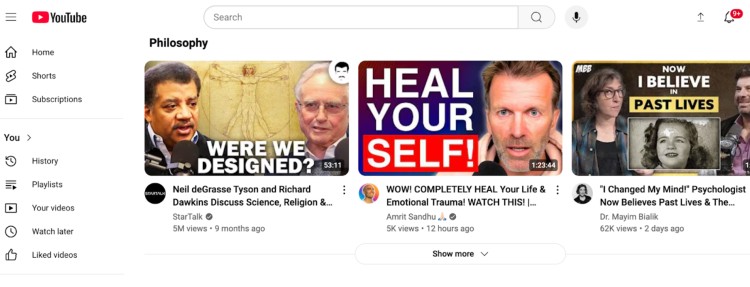
Best for: Earning ad revenue through video podcasts
YouTube Podcasts allow podcasters to monetize through ads, memberships, and sponsorships.
- Commission: 55% of ad revenue. Affiliate marketing commissions vary (typically 10-30%).
- Additional costs: Eligibility: 1,000 subscribers, 4,000 watch hours (or 10 million Shorts views in 90 days). Platform fees for fan funding and merchandise.
Pros:
- Built-in audience and discovery
- Multiple revenue streams (ads, memberships, Super Chats)
Cons:
- Must meet YouTube Partner Program requirements
- Ad revenue can fluctuate
13. Buy Me a Coffee
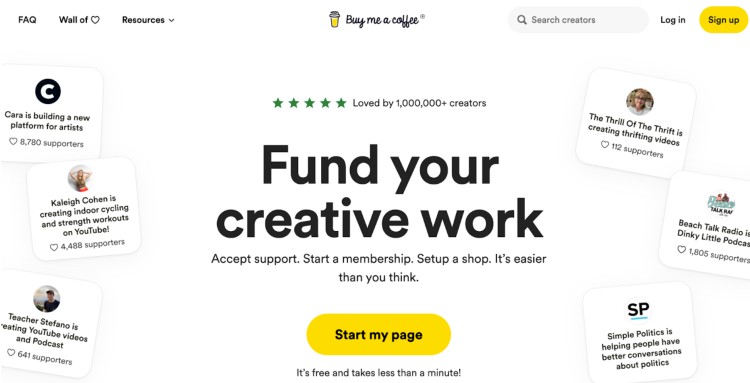
Best for: Support from fans and creators offering exclusive content
Buy Me a Coffee lets podcasters receive direct support from fans through donations, memberships, and exclusive content.
- Commission: 5% transaction fee. Payment processing fees (around 3%, varies by processor).
- Additional costs: No monthly fees. No ads or data sales.
Pros:
- Creators keep 95% of donations
- Easy to use for direct fan support
- No monthly subscription fees
Cons:
- Requires self-promotion
- Limited revenue features compared to full membership platforms
14. Transistor
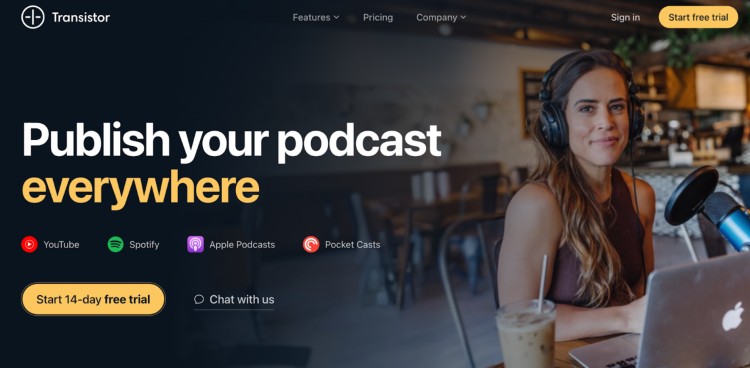
Best for: Private podcast subscriptions
Transistor supports paid, private podcasting for businesses and creators.
- Commission: 25% recurring commission for every customer referred. Cookie lasts 30 days.
- Additional costs: Payments made monthly via PayPal (once balance reaches $200).
Pros:
- No revenue share
- Allows private podcasting for memberships
- Advanced analytics
Cons:
- No built-in sponsorship marketplace
- Requires external marketing
15. Gumroad
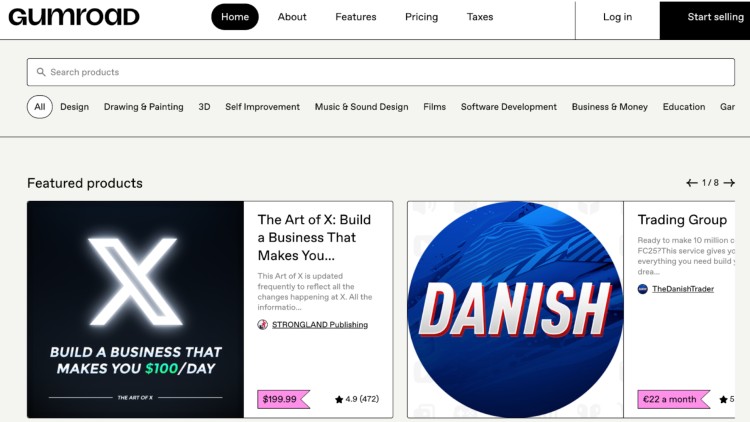
Best for: Selling digital products and exclusive podcast content
Gumroad lets podcasters sell digital products, courses, and premium content.
- Commission: 10% for standard sales (outside Discover). 30% for sales through Gumroad Discover (includes processing fees). Commission for collaborations can be up to 50%.
- Additional costs: Sales tax (depends on the buyer’s location). Payment processing fees: 2.9% + $0.30 per transaction. No monthly fees.
Pros:
- Ideal for bundling podcast content with courses or digital products
- Works for all podcast sizes
Cons:
- Requires self-promotion
15 Ways to Monetize a Podcast
Monetizing your podcast isn’t just for the big names with millions of downloads. One of the benefits of podcasts is that there are plenty of ways to turn your content into revenue, no matter your audience size.
Here are 15 ways to start making money from your podcast:
- Sponsorships and ads: Partner with brands to run ads in your episodes. You can negotiate direct sponsorships or use platforms like AdvertiseCast for automatic ad placements.
- Listener donations: Use platforms like Buy Me a Coffee or Ko-fi to let fans support your podcast with one-time or recurring donations.
- Paid subscriptions: Offer ad-free episodes, bonus content, or early access through platforms like Acast+ or Apple Podcasts Subscriptions.
- Affiliate marketing: Promote products or services with unique affiliate links and earn commissions for every sale made through your podcast.
- Merchandise sales: Sell branded t-shirts, mugs, or other merch through platforms like Printful or Teespring without handling inventory.
- Crowdfunding: Run a campaign on Kickstarter or Indiegogo to fund your podcast’s growth, offering exclusive perks to backers.
- Live events and meetups: Host paid virtual or in-person events, Q&A sessions, or workshops for your audience.
- Online courses and coaching (my favorite): Use your podcast to promote and sell your expertise through coaching sessions, masterclasses, or full courses.
- Repurposing content into books: Turn your podcast insights into a book or eBook and sell it on Amazon, Gumroad, or your podcast website.
- Private podcasting: Create a members-only podcast with exclusive content using platforms like Supercast or Memberful.
- YouTube ad revenue: Upload video versions of your podcast on YouTube and monetize through ads, memberships, and Super Chats. Take notes from the best podcast description examples for better SEO optimization.
- Selling digital products (another personal favorite): Offer templates, guides, workbooks, or exclusive audio content that listeners can purchase.
- Brand collaborations and joint ventures (great for growing your audience too): Partner with other creators or businesses to create co-branded content, paid series, or joint projects.
- Freemium model: Provide free episodes while keeping premium, high-value content behind a paywall.
- Podcast network deals: Join a podcast network that offers monetization opportunities in exchange for a revenue split or exclusivity.
How to Select the Best Podcast Monetization Method
Choosing the right monetization method doesn’t have to be trial and error. Consider these key factors:
- Audience size: Larger audiences may suit ads and sponsorships, while smaller or niche ones might do better with Patreon or premium content.
- Content type: Expert interviews using the best software for podcast interviews work well for sponsored content and affiliate marketing. Personal podcasts may benefit from listener support or merch.
- Engagement level: Highly engaged listeners are ideal for membership platforms or exclusive content.
- Brand and values: Choose monetization methods that align with your podcast’s mission and your audience’s expectations.
- Long-term vision: Planning to scale? Ads and sponsorships are great. Want to keep it small and personal? Go for direct listener support.
- Testing and adapting: Experiment with different methods, track what works, and adjust as your podcast grows.
How to Start Monetizing Your Podcast
Want to turn your podcast into a money-maker? Try these creative methods:
- Create a subscription service: Offer exclusive episodes and behind-the-scenes content directly on your website.
- License your content: Syndicate your podcast to media outlets or radio stations for passive income.
- Host paid challenges or coaching programs: Run high-value challenges, workshops or coaching sessions for your audience.
- Sell podcast transcripts or summaries: Offer easy-to-digest summaries or full transcripts as paid products.
- Offer podcast consultancy: Get booked on podcasts and share your expertise with other podcasters looking to grow their shows.
When to Start Monetizing Your Podcast
Not sure when to monetize? Here’s your guide:
- When you have a consistent audience: Steady growth and engagement are signs you’re ready.
- When your content matches potential advertisers: Attracting brands? Time to explore sponsorships.
- When you hit 500 downloads per episode: A solid benchmark for ad placements and sponsorships.
- When you’re ready for premium content: Offer exclusive episodes or early access to your biggest fans.
- When you’ve tested methods: If one strategy clicks with your audience, go for it!
Free Podcast Hosting with Monetization: How to Make the Most of Zero-Cost Options
Starting a podcast on a budget? Here’s how to make the most of free hosting and monetize early:
- Engage your audience: Build loyalty through social media, email, and listener feedback to attract sponsors.
- Use ads early: Take advantage of ad options on free platforms to start earning with even a small audience.
- Offer exclusive content: Use Patreon for perks (early access, exclusive content) and encourage listener donations.
- Start affiliate marketing: Share affiliate links in episodes or show notes to earn commissions right away.
- Form partnerships: Collaborate with other podcasters or businesses to grow your reach and unlock new revenue streams.
Make Money from Your Mic
You’ve got the tools, now it’s time to put them to work. The best podcast platform for monetization isn’t just for the big names – it’s about finding what clicks with your audience and building from there.
Whether you’re just starting out or already have a solid base, there are plenty of ways to turn your podcast into a revenue stream.
Are you looking for more ways to grow your audience and get your podcast in front of more people?
Talks is the perfect platform to help you connect with the right shows and create more opportunities for exposure and revenue. Simple, effective, and straight to the point.
Sign up for your free Talks creator profile today!
